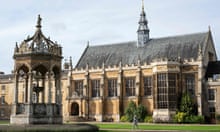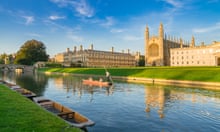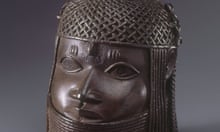Steve Smith’s parents were devastated to be told at school parents’ evening that the best their working‑class son could hope for was a job sweeping floors in the local shoe factory. He is now vice-chancellor of the University of Exeter, part of the elite Russell Group.
Nick Petford left school at 16 and worked in a tool-packing factory before training to install air-conditioning. He is now vice-chancellor of the University of Northampton.
Britain’s most powerful jobs continue to be stacked with a tiny elite of people who attended private schools. But new research suggests that meritocracy is alive and well at the top of our universities. Only 16% of university vice-chancellors went to independent schools, according to a study by the Sutton Trust and the Social Mobility Commission of the educational backgrounds of 5,000 leading figures across a range of jobs.
In contrast, private school alumni make up 65% of judges, 59% of civil service permanent secretaries, 57% of the House of Lords and 44% of national newspaper columnists.
The study demonstrates that higher education – alongside football – is one of the few British professions in which working-class people have been able to reach the top. Smith’s theory is that this is because studying at university is much more of a “leveller” than any other process you go through; the point from which your outcome is no longer determined by your background. And, crucially, he says those who stay on to do research are judged on how good their intellectual work is – in his case, in international relations.
“My first articles weren’t rejected because I was Steve Smith, born in a house with an outside loo – they were blind to my origins,” he says. “And when I became president of the world academic body in my field, it wasn’t because of my class, it was all about my academic record.”
Nonetheless, given that no one in his family had gone on to higher education before, Smith says he wouldn’t have made it to the University of Southampton if someone hadn’t spotted his potential.
His dad came home in tears from that parents’ evening at Norwich City comprehensive school in 1969, because his teacher thought boys like him shouldn’t have ideas above their station. But a second teacher, Mr Shearing, later told Smith that if he stopped mucking around in class he could really go somewhere. “Christ, that made all the difference,” he says. “Someone, somewhere, has to put faith in you to go forward.”

Petford says his life would have taken a very different path if he hadn’t made it to university. A member of Southampton’s first punk band in his teens, he left his comprehensive school at 16 with a handful of CSEs. He got a factory job, because that was what all his mates were doing. Petford doesn’t remember either his school or his parents ever mentioning university to him.
“I was unemployed and on the dole when I saw a poster for a university access course at the age of 23. Seven years later I was a Cambridge don. I guess that’s social mobility in action,” he says. He did his access course at Southwark College and went to Goldsmiths.
Petford is now a top volcanologist, and, like Smith, argues that vice-chancellors are different from leaders in other professions because they typically have to have a proven academic record that is based on peer review. “Esteem in this sense can be a great leveller, allowing you to build a career based on what you’ve done, not where you come from.”
But he warns that snobbery can still triumph in universities if the appointment board is not open-minded. “If a university’s board of governors is dominated by alumni from Oxbridge colleges and is intent on hiring a vice-chancellor from the Russell Group, because that’s where they assume managerial quality resides, then diversity becomes restricted.”
The research found that although only 1% of the general population go to Oxford or Cambridge universities, a quarter of Britain’s professional leaders [24%] attended these two elite institutions. The figure rises to 71% for Britain’s senior judges. In total, 19% of vice-chancellors went to Oxbridge – although some came from underprivileged beginnings.
Paul O’Prey, who has recently retired after running the University of Roehampton for 15 years, won a place at Oxford to study English, despite his council house burning down when he was in the sixth form.
“In the admissions interview a very distinguished don sat reading my form, then looked up and said, ‘You must feel like Jude the Obscure’ [the Thomas Hardy character who yearns to study at Oxbridge]. To which I replied, ‘No, not really.’ And he said, ‘Oh, why not?’ And I said, ‘Well, because he didn’t get in’,” he recalls.
O’Prey is concerned for the future, however. He worries that lack of funding for PhDs is making it harder for people from poorer backgrounds to get a foot on the academic career ladder. “There was greater access to grants when I was young, so entry was more possible regardless of background,” he says. “A lot of PhD students have to support themselves now and there is a risk it could become a middle-class profession.”
Peter Mathieson, the new head of the University of Edinburgh, did his PhD at Cambridge, but insists it wasn’t a leg-up. He grew up on a poor street in Penzance, Cornwall, and went to an underperforming state school. When Mathieson told his teachers he wanted to study medicine, they said he “would only be disappointed” if he tried. It was “like a red rag to a bull”, he recalls, and at 15 he made an appointment to see his family doctor alone, to ask for advice on where to study.
“The key step for me was getting to university, which I did partly through sheer bloody-mindedness.”
Mathieson has recently caused controversy by publishing contextual requirements for all courses at Edinburgh, showing explicitly that those from less-privileged backgrounds can get in with lower grades than their fee-paying counterparts. “It arouses strong feelings, as inevitably some well-qualified students won’t get in,” he says. “But I don’t believe we are lowering standards: we are levelling the playing field.”
Anne Carlisle, vice-chancellor of Falmouth University, grew up on a farm with seven siblings outside Belfast, in an area where no one went to university.
She admits that rising through the ranks in academia, she has encountered snobbery based on both her gender and the fact that she studied fine art. But she argues that the top jobs in higher education are opening up more as people see that university chiefs are basically running a company – and the key thing is demonstrating you have the skills to do that.
“At some universities researchers think they are a breed apart and they very much operate on networks. There are a few of that type running universities still – but they are in the minority. Most of us come up through the ranks and can point to what we have achieved.”










Comments (…)
Sign in or create your Guardian account to join the discussion